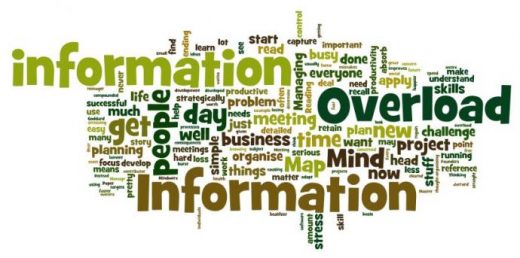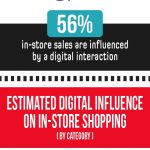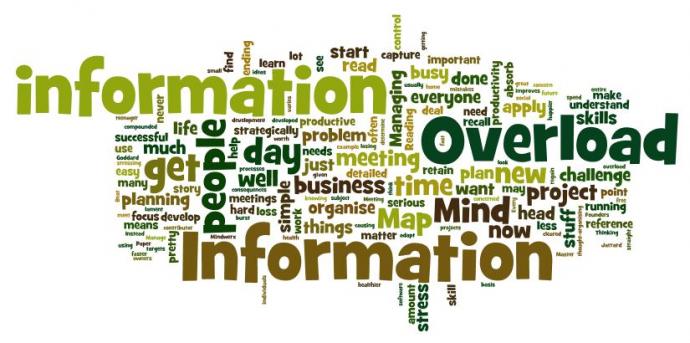Information Overload: The Digital Age Epidemic Plaguing Training & Costing Companies Millions
April 20, 2016
The digital era has not only offered more opportunity to access and engage with information, but it has also dramatically expanded the scope of human knowledge.
According to former Google CEO Eric Schmidt: “There was five exabytes of information created between the dawn of civilization through 2003, but that much information is now created every 2 days, and the pace is increasing.” That was in 2010.
All this information is a good thing, right?
It turns out that while access to information is leveling the playing field and opening the door of opportunity in many cases, studies show that the sheer quantity of information, coupled with on-demand access, can have negative effects.
Too much information arrests our attention spans, paralyzes us into a state of inaction and negatively impacts our ability to make smart decisions, ultimately costing companies millions each year.
How Information Overload Plagues Society
So how exactly does information overload impact corporate learning? Research by Angelika Dimoka, director of the Center for Neural Decision Making at Temple University, shows that once people reach cognitive and information overload the brain region responsible for making smart decisions is turned off.
Additional research from the cognitive sciences demonstrates that some of the scientifically proven keys to long-term retention of information are made impossible in an “information overload” situation. Here are just three examples:
- Attention: The distraction of social media, mobile devices, online games, and streaming videos interferes considerably with working memory and other processes critical for learning. Research shows that multiple streams of information impair the mental processes required to encode, store, and retrieve information.
- Consolidation: Constant bombardment of new information hijacks the brain’s consolidation process. The brain needs time for newly learned information to “sink in”. While this process occurs, memory is surprisingly fragile and is vulnerable to disruption.
- Spacing: Information overload often requires learners to “cram” to acquire new learning. But science has shown that distributing study sessions over days or weeks improves long-term retention, while reviewing information repeatedly in a condensed period of time (e.g., cramming) results in poor retention rates. Seeing information again after the passage of time tells the brain that this information must be important… remember it!
This leads to some very serious problems in the workplace. In addition to poor decision-making, information overload can cause:
- Analysis Paralysis – Becoming overwhelmed with a plethora of information results in a state of inaction – one cannot decide the correct course of action because of too many varying opinions, facts and options. In fact, research shows that the IQ scores of workers who were distracted by e-mail and phone calls fell by an average of 10 points – twice the decline recorded for those smoking marijuana.
- Productivity Issues –Researching and absorbing information causes one to “feel” productive, but unless the knowledge is immediately acted or elaborated upon, it will not be stored in long-term memory and the time spent in learning or training is wasted. In fact, people will forget about 75% of what they’ve learned if the information is not used immediately.
- Lack of Focus – Information overload through social media, e-mail and many other platforms for accessing information is the kryptonite to productivity, because it interrupts one from focusing on the task at hand. People take an average of nearly 25 minutes to return to a work task after an e-mail interruption, and interruptions of this nature cost organizations $ 1 billion annually.
- Misinformation – Through accessing a ton of information, our brains gain familiarity with the content that leads to an “illusion of knowing.” Illusions of knowing are a sense of familiarity with the material leading to the false impressions that “I knew it all along” and “I will know it in the future.” Not only do these illusions of knowing result in poor knowledge retention, but they also create a false sense of confidence that leads to misinformation – (information that employees believe that they know, but is actually incorrect).
While the majority of the eLearning industry ignores information overload and its negative outcomes, there are a few technologies tackling this problem head on. By incorporating techniques from the cognitive sciences — like spacing, retrieval practice, automatic time-outs, metacognitive analysis and priming — a small group of hyper adaptive learning technologies are improving learner engagement, boosting knowledge acquisition and retention and identifying and remediating misinformation.
This white paper, Misinformation, How to Identify & Remediate False Knowledge, examines the causes and implications of this last variable – misinformation – more in depth, and offers actionable insights into how organizations can identify and remediate this costly phenomenon.
Digital & Social Articles on Business 2 Community
(18)














